【新唐人2011年10月26日訊】中共人大常委會10月24號初次審議《精神衛生法》草案,根據這一草案,送非精神病患者進醫療機構,將被追究法律責任。多年來,大量的訪民、法輪功學員、甚至維權律師被送進精神病院遭受迫害。法律專家指出,這一《草案》難以制止廣泛存在的「被精神病」現象。
中共衛生部長陳竺24號承認,目前在精神衛生方面存在三大突出問題,包括:精神病患者的合法權益沒有得到保障,強制收治的程序存在缺失,導致「被精神病」事件不時成為輿論熱點。
今年4月,中國上演了真實版的「飛越瘋人院」,武鋼職工徐武與單位打官司,卻被送進精神病院,收治4年多後出逃到廣州,引起全國公眾關注。而此前的「徐林東案」、「彭寶泉案」也為社會重新關注。
無償代理徐武「被精神病案」的著名公益律師黃雪濤,接受本臺採訪指出,濫用精神病收治在中國廣泛存在。
深圳衡平機構負責人黃雪濤律師:「因為過去十幾年來,中國整個精神病領域所運行的一套模式,都是否定精神病人拒絕住院的權利。在這麼樣一套有瑕疵的理論影響下,各個地方的一些立法,還有影響到全國的精神病收治這套實際操作的運作模式,都是有嚴重的法律漏洞的。」
新的草案規定患者被精神病院收治前,須經過兩次複診、兩次鑑定,住院治療實行自願原則。故意將非精神病患者送入醫療機構,非法限制患者離開醫療機構,將被追究刑事及民事責任。
北京維權律師江天勇:「但是我們知道中國由於體制的問題,真正這樣的對民眾有利的法律會不會被尊重,真的很難說。尤其是,這麼長時間以來發生了很多事情,實際上法律是被踐踏的。」
今年2月「茉莉花行動」後,被強制失蹤的大批維權人士,幾乎全都遭到酷刑、虐待和逼供,包括接受《新唐人》採訪的北京維權律師江天勇。
北京維權律師金光鴻則被關進精神病院,連續幾天被毆打,並被綁在床上,被強制注射不明藥物,使他的記憶力受到損害。
傳播「茉莉花革命」消息的網友胡荻「被失蹤」後,被送進合肥市精神專科醫院,院方用藥物和電磁波折磨他。參與「茉莉花行動」的安徽維權人士錢進,被強制關進精神病院4個月,也被注射藥物。
錢進:「一般打針量在一個星期左右,它產生的副作用就是身體僵硬、舌頭髮麻,因為舌頭僵硬語言表達不清,動作遲鈍,流鼻涕、流口水。他簡直就是迫害人權,一點法律都沒有,強制性把一個正常人往精神病院裡面送,然後政府和醫院串通在一起,你沒精神病也有精神病了。」
《21世紀經濟報導》指出,目前收治的精神病院分為隸屬衛生系統、民政系統、公安系統三類。收治徐武等部分上訪者的精神病院就隸屬公安系統,這個系統下的所有醫院統一稱為「安康醫院」。
這次《精神衛生法》草案由衛生部牽頭,黃雪濤律師表示,精神衛生法對安康醫院並不完全適用。在安康醫院,是公安自行決定是否強制治療,而不是法院和個人。
今年4月,合肥市訪民胡東聖在北京公安部上訪被打,隨後第二次被關進安康醫院。胡東聖曾任物流公司經理和黨支部書記,他因被強制拆遷而上訪,在此之前曾被關進安康醫院達6個月。
江天勇:「整體上中國這樣的法制環境是一個嚴重倒退的環境,我們看到,很多的立法實際上是公安在主導,他們的出發點就是如何更快的抓人,更順當的抓人,更順當的把人送到監獄去,更方便的剝奪人的自由權利。在這樣一個主導思想下,人的權利真的很難得到保障。」
「歐洲中國精神病觀察小組」指出,今年中共利用精神病院打壓維權人士的現象更加嚴重。
香港《動向》雜誌主編張偉國指出,以維穩至上的中共集權專制,是把正常人變成「精神病」的禍根。
新唐人記者常春、李元翰、肖顔採訪報導。
『One Flew Over the Cuckoo's Nest』: Real Cases
On October 24, CCP『s (Chinese Communist Party) Standing
Committee conducted a review of the Mental Health Act draft.
The draft states that delivery of non-psychiatric patients into
medical institutions shall be investigated for criminal liability.
Countless petitioners, Falun Gong practitioners, and rights
lawyers are sent to mental hospitals, tortured and persecuted.
Legal experts say, it will be difficult for this draft to stop
the widespread "enforced psychiatric" phenomenon in China.
On October 24, Chinese Health Minister Chen Zhu admitted
that mental health faces three prominent problems.
For one, mental patients』 legal rights cannot be guaranteed.
Issues also exist with enforced hospitalization, which keeps
creating "enforced psychiatric" events, drawing public attention.
"One Flew Over the Cuckoo's Nest" was staged in reality.
In April, Xu Wu, a worker at Wuhan Iron and Steel Corp.,
initiated a lawsuit, but was sent to a mental hospital.
Four years later, he fled to Guangzhou.
The incident aroused public concerns in China.
Prior to that, the "Xu Lindong case"
and "Peng Baoquan case" drew the community』s attention.
Renowned public interest lawyer, Huang Xuetao represented
Xu Wu pro bono and told NTD that psychiatric abuse is common across China.
Huang Xuetao (Director, Equity & Justice Initiative):
"Over decades, the entire field of mental health in China negates mental patients』 right of rejecting to be hospitalized.
With such a flawed theory, local legislations and the national
mode of hospitalizing patients, has serious legal loopholes.”
The new draft states that twice return visits and twice
authentications will be given prior to patients』 hospitalization.
This shall be implemented based on the “voluntary” principle.
Forceful delivery of non-psychiatric patients to medical
institutions, and restricting a patient』s leaving, shall be investigated for criminal and civil liability.
Jiang Tianyong (Beijing Rights Lawyer): “Due to China』s
institutional problems, it is hard to say if such a law that is really in favor of civilians, will be respected or not.
In particular, so many things happened for so long,
the law has been trampled in reality."
After an online call for a Jasmine Revolution in February,
almost all activists of enforced disappearance suffered torture, abuse and extorted confessions.
Lawyer Jiang Tianyong is just one of them.
Jin Guanghong, another Beijing-based rights lawyer,
was sent to a psychiatric hospital.
He was beaten for several days, tied to a bed and injected
with unknown drugs which damaged his memory.
Due to spreading the message of the Jasmine Revolution,
netizen Hu Di was sent to a psychiatric hospital in Hefei city, and was tortured with drugs and electromagnetic waves.
An activist in Anhui, Qian Jin, was taken by force to a mental
hospital for four months, and was also injected with drugs.
Qian Jin: "Generally, one shot of injection lasted for a week.
It produced side effects like stiff, numb tongue, resulting in
unclear expression, slow action, a runny nose and drooling.
This was vaiolation of human rights, completely illegal.
They forcefully sent a normal person to a mental hospital.
The authorities conspire with the hospital to turn you
into a real patient with mental illness.”
21st Century Business Herald reported that mental hospitals
hospitalizing patients are divided into three categories.
1. Under the health system. 2. Under the civil system.
3. Under the security system.
The hospital in which Xu Wu and some petitioners were
hospitalized is under the security system.
All hospitals under the security system
are called "Akang."
The draft of the Mental Health Act was led
by the CCP』s Health Ministry.
Lawyer Huang Xuetao said that the Mental Health Act
does not quite apply to the Ankang hospitals.
In Ankang hospitals, public security decides whether to
conduct medical treatment, rather than courts or individuals.
In April, a petitioner in Hefei, Hu Dongsheng, was beaten
when he petitioned at the CCP』s Ministry of Public Security.
He was then thrown into an Ankang hospital
for the second time.
Hu Dongsheng was the manager
and CCP branch secretary in a logistics company.
Hu petitioned after suffering forced house demolition. Prior
to that, he was locked in an Ankang hospital for six months.
Jiang Tianyong: "As a whole, the legal environment
in China has a serious setback.
What we saw is that a lot of legislations are dominated
by the public security.
Their goal is to arrest people faster, smoothly capture and
imprison, and deprive freedom and rights more conveniently.
With such a guiding ideology, human rights in China
are really hard to be guaranteed.”
The European Observatory on Mental Health China Group
pointed out that this year the situation became more serious.
CCP authorities were utilizing psychiatric hospitals
to suppress activists.
Hong Kong』s Trend』 Editor-in-Chief, Zhang Weiguo, said
CCP centralizes autocratic authorities, prioritizing “stability.”
He believes this is the source of the disaster, turning
a normal citizen into a “patient with mental illness.”
NTD reporters Chang Chun, Li Yuanhan and Xiao Yan
看下一集

【禁聞】「限娛令」出臺 央視受寵

【禁聞】“倒閉潮”懸頂珠三角

【禁聞】中共反恐定義擴大化 被指打壓維權

【禁聞】後小悅悅 中國需要的是甚麼?
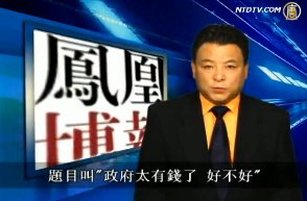
【禁言博客】政府太有錢了,好不好?

【禁聞論壇】“我們老了,誰來養我們?”
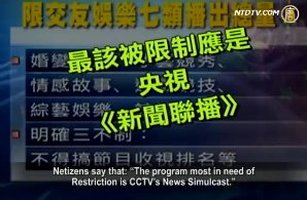
【禁聞】限娛令引輿論沸騰 廣電自稱黨喉舌
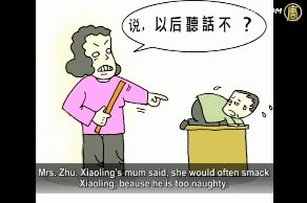
【禁聞】驚心!陸6歲童愿望是殺死媽媽
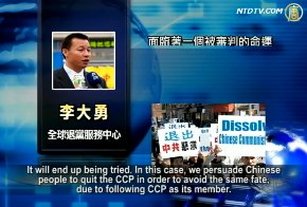
【禁聞】學者為中共開藥 專家:重疾難治
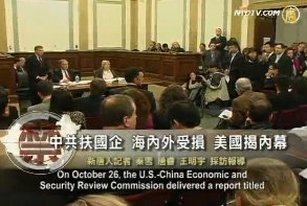
【禁聞】中共扶國企 海內外受損 美國揭內幕

【禁聞】中國暫停稀土生產 引發國際問題

【禁聞】浙抗稅民眾指武警打死人 當局否認

【禁聞】陸軍警訓練 對付訪民 機密視頻洩漏

【禁聞】中國的法律體系 能保障人民自由﹖
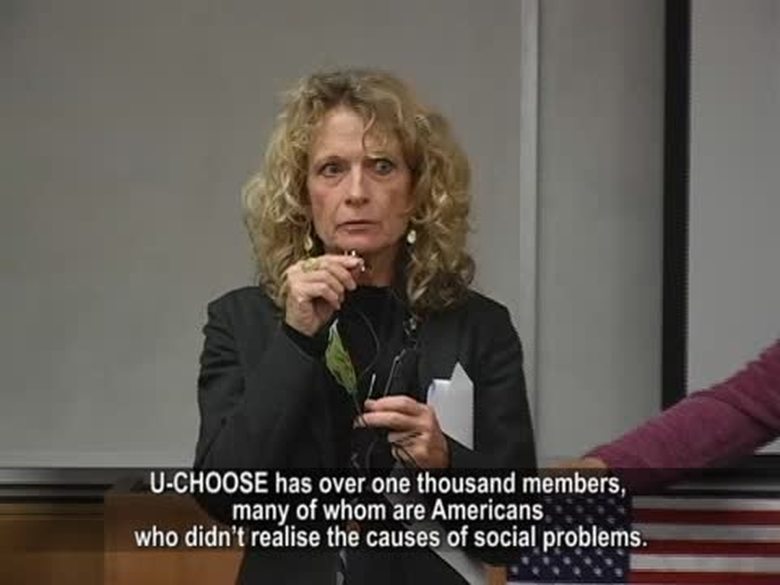
【禁聞】美國民眾拋棄高福利共產主義

【禁聞】大陸降價退房潮湧 業主維權砸樓盤








